 klaus-michael schneider
klaus-michael schneider
Keywords: colombia |
Links: FOTW homepage | search | disclaimer and copyright | write us | mirrors

Last modified: 2021-08-26 by  klaus-michael schneider
klaus-michael schneider
Keywords: colombia |
Links: FOTW homepage |
search |
disclaimer and copyright |
write us |
mirrors
Editorial Remark: It must be noted that all the opinions are of the authors and not of FOTW. Our site is non-political and concentrates only on vexillological issues.
See also:
.jpg) image from official
website
image from official
website
logo
The Movimiento AICO (Autoridades Indígenas de Colombia), or
Colombian Indigenous Authorities. With the establishment of the CRIC, the Guambiano or Misak tribe got some
representation and a movement to stand up for their rights.
However in 1980 the Guambiano people left the CRIC because they
thought the CRIC was merely a business-related organization, and
too far from the native community it said it represented. That is
when the AISO (Autoridades Indígenas del Suroccidente de
Colombia), or South West Colombian Indigenous Authorities is
established. Then in 1987, together with the Cabildo Indígena
Pasto, Cabildo Indígena Camsá and Confederación Indígena
Tairona they established the Movimiento AICO for the
"political, economic and social ecological reconstruction
and recovering of the proper cultural values of the native
peoples. It has has nationwide representation at Department and
City levels, at different governmental branches.
Source: official website.
E.R., 12 November 2007
.jpg) image from
Medellin
Mayor election card
image from
Medellin
Mayor election card
logo
The Movimiento ALAS-Equipo Colombia (lit. WINGS - Team
Colombia) is a center-right Party which is a merger between two
already existing political parties: ALAS and Equipo Colombia.
ALAS (lit. WINGS) stands for Alternativa Liberal de Avanzada
Social (Advanced Social Liberal Alternative) and Equipo Colombia
(Team Colombia). ALAS emerged in the late 1990s as an internal
group within the
Liberal Party, with
representation in Congress only for the Department of Cesar. However in 2005 ALAS broke away
from the Liberal Party and started to join forces with the Equipo
Colombia Movement officially on December 14, 2005. Equipo Colombia
on the other hand, was a political movement established back in
1992 in the Department of Antioquia
under the name Equipo Unionista, most of them coming from the
Conservative Party. The Movimiento
ALAS-Equipo Colombia has local and national representation at
various levels.
Sources:
Spanish
wikipedia,
official
website,
Medellin
Mayor election card.
 image by Dov Gutterman, 7 September 2007
image by Dov Gutterman, 7 September 2007
flag
.jpg) image contributed by Jaumé Ollé
image contributed by Jaumé Ollé
logo
CLBN - Coordinadora Libertaria Banderas Negras (Black Flags
Libertarian Coordination), is an anarchist movement established
in 2001.
E.R., 2 September 2007
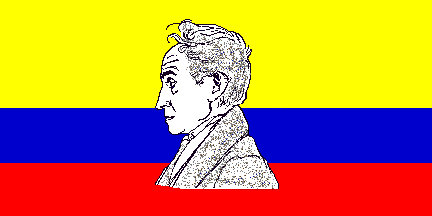 image by Guillermo Aveledo, 30 November 2000
image by Guillermo Aveledo, 30 November 2000
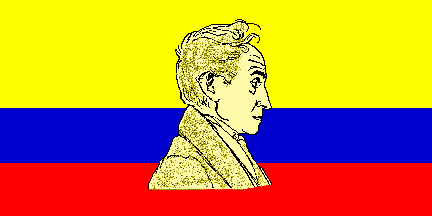 image by Guillermo Aveledo and Eugene Ipavec, 8
June 2006
image by Guillermo Aveledo and Eugene Ipavec, 8
June 2006
Here's the flag of the Movimiento Bolivariano para la Nueva
Colombia (Bolivarian Movement for the New Colombia), what has
been instituted as the political wing of the
Revolutionary Armed Force of Colombia - People's Army (FARC-EP), and founded early this year.
The flag is a typical Colombian tricolor, with a portrait of
Simon Bolivar (in black and white and certain shades of grey)
centered on it. The portrait used is a reproduction of the famous
(and supposedly more accurate) portrait of Bolivar engraved by
French artist Francois Desire Roulin (1796-1874) at Bogota dated
February 15th, 1828.
Oddly enough, it seems an unbecoming choice for a revolutionary
party/army: by 1828 Bolivar was serving as dictator of Colombia
(then the Great Colombia; the union of Nueva Granada, Quito and
Venezuela), allied with conservative and clerical groups who were
interested in the union of the republics and, willing to support
Bolivar, played for the predominance of Bogota in such an union.
The rest is history. Perhaps this paradox is explained by the
fact that, in the actual portrait, Bolivar faces rightwards, and
not leftwards, as is used by the FARC-EP.
Guillermo Aveledo, 30 November 2000
The flag size should be the same as the Colombian one and the
face of Simón Bolívar should be on yellow background instead of
white, and looking towards the right, and not look towards the
left.
It is based upon a Photo taken on August 29, 2000, during the
launching of the illegal movement by the Farc at www.sedoparking.com.
The event is the official launching of the Bolivarian Movement
for the New Colombia (Movimiento Bolivariano para la Nueva
Colombia) during the failed Peace Process between the Colombian
Government and this guerrilla group, during the period of
1998-2002. This act was carried out in the town of San Vicente del Caguán, a Municipality
of the Department of Caquetá which was
part of a Demilitarized Zone that the Government voluntarily gave
to this guerrilla in order to provide security and trust to
conduct the Peace Process.
E.R., 4 and 8 June 2006
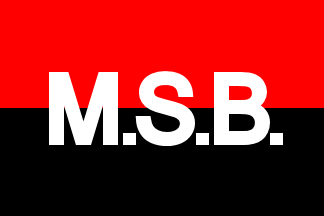 image by Eugene Ipavec, 14 January 2010
image by Eugene Ipavec, 14 January 2010
Movimiento Socialista Bolivariano (Bolivarian Socialist
Movement) is a communist movement established in Colombia first
in bordering cities with Venezuela and inspired by Venezuela's
current government headed by Hugo Chávez. It is a movement, not
a recognized political party in Colombia yet.
The flag is a red/black horizontal flag with the letters M.S.B.
in the middle in white, pretty much inspired by the Cuban 26 de Julio movement since Chávez himself
has said that his political inspiration is Fidel Castro.
The movement was established in 2007 and the flag is seen in many
websites such as www.asiescucuta.com,
www.radiomundial.com.ve,
cucuta-politica.blogspot.com;
etc.
Source:
www.eltiempo.com.
E.R., 14 January 2010
.jpg) image from
Medellin
electoral card
image from
Medellin
electoral card
The Partido Opción Centro (Center Option) - The Party was
established on November 25, 2005, in the city of Bogota, with the
participation of delegates from 19 Departments, gathering people
who wanted to represent the political option for peace and
reconciliation (center) and the green environmental issues as
well (a non-existing political option at the time in Colombia).
It currently has representation in two Departments and several
other cities nationwide.
Sources:
Medellin
electoral card, official
website.
E.R., 22 November 2007
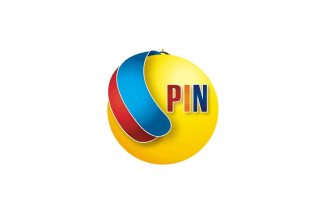 image contributed by Zoltan Horvath, 06 August 2015
image contributed by Zoltan Horvath, 06 August 2015
The political movement currently called Opción Ciudadana (Citizen Option)
first appeared as Partido Convergencia Ciudadana (Citizen Convergence Party) (official
website: http://www.convergencia.org.co, broken link) established on July
24, 1997. Then on November 9, 2009 the party changed its name to PIN (Partido de
Integración Nacional, National Integration Party) (official websites: http://www.partidopin.org
and http://www.partidopin.com, broken links). Then it changed its name again
to its current version on 2013.
Sources:
https://es.wikipedia.org/wiki/Partido_Convergencia_Ciudadana
https://en.wikipedia.org/wiki/National_Integration_Party_(Colombia)
https://es.wikipedia.org/wiki/Opci%C3%B3n_Ciudadana
The
party's statutes mentions the logo and the flag (pages 9 and 10). PIN's logo
and corporate identity manual is seen
here.
Opción Ciudadana's logo and corporate identity manual is seen
here and
here.
The flag of Opción Ciudadana is seen
here and
here (a horizontal white flag featuring this
alternative logo.
Source:
http://www.partidoopcionciudadana.com/portal/index.php/multimedia-y-descagas/fotos
The official logo is seen
here.
For additional information go to:
Opción Ciudadana (official
website)
Esteban Rivera, 06 August 2015
I haven't found any image about its current flag (if any), but flag of
Partido de Integración Nacional (PIN) is shown on pictures you linked. They were
taken during party 2013 congress, probably before renaming the party, that's why
PIN flag is shown. There is a
picture about this flag with better visibility.
Zoltan Horvath, 06 August 2015
Indeed the
picture you mention is the PIN flag. The issue is that the links I sent
regarding the
pictures and
here in my opinion, are pictures of the flag of Opción Ciudadana, what do
you think? Or maybe I got the wrong impression?
Esteban Rivera, 06 August 2015
These pictures were taken during the same event in 2013, and you can see the
whole photoset. Left side of red letter P of part of party logo (behind the
lady's head) can be seen on picture you linked.
I'm quite sure it's flag of PIN (or previous) party flag.
New party flag could be also white but with new phoenix emblem and slogan as it
was introduced in visual identity document, but I haven't found any visual
evidence of it.
Zoltan Horvath, 06 August 2015
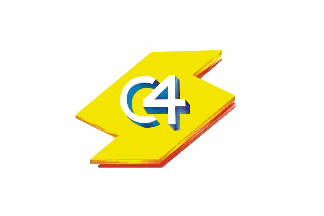 image contributed by E.R., 16 June 2005
image contributed by E.R., 16 June 2005
There is a political movement in Colombia called
"Movimiento Compromiso Civico Cristiano con la
Comunidad" (Civilian Christian Commitment with the
Community Movement) which is abbreviated as PC4, which stands for
Partido C4 (or C4 Party). It currently has one seat in Colombia's
Senate. Its official website is www.pc4.org.
E.R., 16 June 2005
Speaking of the PC4 party (which according to the new law is
not a valid political party anymore because it did not achieve
enough votes in the 2006 elections), the image featured on the
website is the flag, but actually it should have the same ratio
as most standard flags.
E.R., 12 August 2007